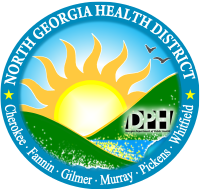- Written by Georgia Department of Public Health
- Category: Hot Topics
Vaccination More Urgent Than Ever
COVID-19 Cases Increase and Delta Variant Spreads in Georgia
ATLANTA – If you were waiting for the right time to get vaccinated, that time is now! The Georgia Department of Public Health (DPH) is urging Georgians to get vaccinated as the number of new COVID-19 cases increases daily and the Delta variant spreads.
The COVID case rate in Georgia has increased 204% over the last 14-day period. Yesterday new cases totaled 4,612 – the highest daily number since mid-February. Hospitalizations have increased by about 50% in the last 14 days, and deaths have increased by about 18% in the same period. Vaccination has stalled statewide and only 40% of Georgians are fully vaccinated.
The Centers for Disease Control and Prevention (CDC) estimates the Delta variant accounts for 78% of new COVID cases in Georgia, making vaccination more urgent than ever. The Delta variant spreads more than twice as easily from one person to another, compared with earlier strains. The highest spread of cases and severe outcomes are happening in places with low vaccination rates, and virtually all hospitalizations and deaths continue to be among the unvaccinated.
“Unfortunately, we can expect COVID numbers to keep growing. People who are unvaccinated or skip their second dose of vaccine are targets for infection,” said Kathleen E. Toomey, M.D., M.P.H., commissioner of the Georgia Department of Public Health. “Getting vaccinated is the best way to prevent the spread of COVID-19 and the Delta variant. High vaccination coverage will reduce spread of the virus in your community and elsewhere - and help prevent new variants from emerging.”
- Hits: 3247
- Written by Jennifer King, District Public Information Officer
- Category: Public Service Announcements
WIC Services Will Continue Both Days
Canton, GA - Cherokee County Health Department’s Canton Health Center on Univeter Road will be CLOSED Thursday, August 5th and Friday, August 6th while staff completes the move into their newly added building space. WIC services will NOT be affected by this closing and will continue to operate at the facility both days. All public health services at the Canton location will resume as normal on Monday, August 9th at 7:30 AM. To learn about public health services provided in Cherokee County, refer to the North Georgia Health District website at https://nghd.org/nghd-locations-listing/category/cherokee.
- Hits: 1921
- Written by Centers for Disease Control and Prevention
- Category: Media Releases
TOP 5 THINGS TO KNOW ABOUT COVID-19 AND DELTA VARIANT
- Getting vaccinated prevents severe illness, hospitalization, and death; it also helps reduce the spread of the virus in communities.
- Unvaccinated individuals should get vaccinated and continue masking until they are fully vaccinated.
- With the Delta variant, this is more urgent than ever. The highest spread of cases and severe outcomes is happening in places with low vaccination rates.
- Data show Delta is different than past versions of the virus: it is much more contagious.
- Some vaccinated people can get Delta in a breakthrough infection and may be contagious.
- Even so, vaccinated individuals represent a very small amount of transmission occurring around the country.
- Virtually all hospitalizations and deaths continue to be among the unvaccinated.
- In areas with substantial and high transmission, CDC recommends that everyone (including fully vaccinated individuals) wear a mask in public indoor settings to help prevent spread of Delta and protect others.
- CDC recommends that community leaders encourage vaccination and masking to prevent further outbreaks in areas of substantial and high transmission.
- CDC recommends universal indoor masking for all teachers, staff, students, and visitors to K-12 schools, regardless of vaccination status. Children should return to full-time in-person learning in the fall with layered prevention strategies in place.
- Hits: 5192
- Written by CDC
- Category: Media Releases
Click to link to guidelines
The new guidelines include notable updates from the previous 2015 guidance, including:
- Updated treatment recommendations for chlamydia, trichomoniasis, and pelvic inflammatory disease.
- Updated treatment recommendations for uncomplicated gonorrhea in neonates, children, and other specific clinical situations (e.g., proctitis, epididymitis, sexual assault), which builds on broader treatment changes published in Morbidity and Mortality Weekly Report late last year.
- Information on FDA-cleared diagnostic tests for Mycoplasma genitalium and rectal and pharyngeal chlamydia and gonorrhea.
- Expanded risk factors for syphilis testing among pregnant patients.
- Recommended two-step serologic testing for diagnosing genital herpes simplex virus.
- Harmonized recommendations for human papillomavirus vaccination with the Advisory Committee on Immunization Practices.
- Recommended universal hepatitis C testing in alignment with CDC’s 2020 hepatitis C testing recommendations.
STIs are common and costly to the nation’s health and economy. With 26 million new STIs occurring each year, totaling nearly $16 billion in medical costs, evidence-based prevention, diagnostic, and treatment recommendations are critical to halting continued increases.
The new recommendations come at a pivotal moment in our field’s history. As many of you know all too well, the COVID-19 pandemic caused decreased clinic capacity, as well as drug and diagnostic test kit shortages. Along the way, CDC provided guidance for the disruption of STD clinical services, focusing on syndromic management and STI screening approaches to maximize the number of people with STIs identified and treated, while prioritizing those most likely to experience complications. However, most drug and testing kit shortages have since resolved and many health care providers are returning to normal clinical practices, which includes conducting STI evaluation and management in accordance with CDC Sexually Transmitted Infections Treatment Guidelines, 2021.
- Hits: 4105




